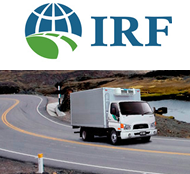 Alexandria, Virginia – IRF once more broke ground by gathering over 600 regional transportation officials for the world’s first comprehensive review of sustainable transportation solutions in the context of the Andean Region. Lima, Peru, an important regional crossroads for trade and a hub for engineering know-how offered an ideal backdrop for the Congress.
Alexandria, Virginia – IRF once more broke ground by gathering over 600 regional transportation officials for the world’s first comprehensive review of sustainable transportation solutions in the context of the Andean Region. Lima, Peru, an important regional crossroads for trade and a hub for engineering know-how offered an ideal backdrop for the Congress.
“We express our gratitude to the government of Peru, and in particular, Minister Paredes and Vice-Minister Chang, who engaged IRF in this initiative,” commented Abdullah Al-Mogbel, Chairman of the International Road Federation and Mayor of Riyadh (Kingdom of Saudi Arabia). Chairman Al-Mogbel added, “This partnership is yet another opportunity for IRF to serve as a global and regional hub for technology transfer in the road and transport sector.”
The event offered a comprehensive panorama of design, construction, and maintenance solutions adapted to the region’s exceptionally complex topography. Geological and climatic considerations present specific challenges to highway engineers and, if not preventively addressed at design phase, lead to accelerated pavement damage and dangerous driving conditions.
Components of a multi-tiered response were presented by regional and international specialists. Polymer pavements, advanced tunnel safety solutions and weigh-in-motion systems coupled with enhanced enforcement of authorized weight limits were just some of the high benefit-to-cost measures discussed during the three-day Congress.
The resulting investments can present a hurdle to the region’s public authorities, particularly on roads with low traffic volumes, leading to innovative concession models tailored to economic realities and trade development potential. Examples of highly successful public private partnerships are visible on the Interoceanic Road, a 2,500 km transcontinental highway connecting Peru and Brazil.
“The Andean Highway Congress has offered an extraordinary and unprecedented learning opportunity for a wide variety of regional actors” noted Patrick Sankey, President & CEO of the International Road Federation. “Peruvian highways are gaining ground as a model of social and environmental responsibility. Illustrations of good practices presented during the Congress ranged from pavement recycling, which minimizes the use of new materials and energy consumption, to preventive maintenance, which extend the service life of roads with minimal impact on traffic flow,” continued Sankey.
ABOUT IRF
Founded in 1948 in Washington DC, the International Road Federation (IRF) is a non-governmental, not-for-profit organization with members from both the public and private sectors in 90 countries worldwide. IRF promotes the development and maintenance of better, safer roads and road networks throughout the world, using technological solutions and management practices that provide maximum economic and social returns from road investment. For more information about IRF, please visit www.irfnews.org











